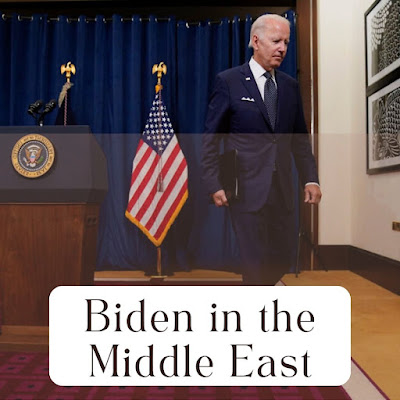During his diplomatic journey to Israel, the West Bank, and Saudi Arabia, President Obama experienced a number of setbacks. He was held responsible for the mistakes of his predecessors, but he also made his own.
 |
| [Joe Biden in the Middle East] |
The President of the United States, Joe Biden, traveled to the Middle East in order to reaffirm his country's commitment to the region, which is one in which he has continued to accumulate a number of disappointments. The primary objective of this trip was to reaffirm the commitment of the United States to the Middle East. One thing is quite clear now that this trip is over: it did nothing except disappoint those who attended.
The Israelis were left with no choice but to lament his predecessor, Donald Trump, who had brought the diplomacy of the United States closer than it had ever been to the unyielding stances of the Jewish state. The Palestinians have lamented the lack of significant gestures that could have translated Washington's stated desire to once again become the "honest broker" of an antiquated Israeli-Palestinian peace process. These gestures could have translated Washington's desire to once again become the "honest broker" of an Israeli-Palestinian peace process. There was no shortage of opportunities, however, from the reopening of the US consulate in East Jerusalem that was once dedicated to the Palestinians to a genuine tribute to the Palestinian-American journalist Shireen Abu Akleh, who was killed by Israeli gunfire in May. Both of these events took place in East Jerusalem.
The most sensitive step for Joe Biden was supposed to take place in Jeddah, Saudi Arabia, which was going to be the location of a meeting with Mohammed Ben Salman, who is the crown prince and the de facto ruler of the country. Because of his suspected role in the murder of dissident Jamal Khashoggi under heinous circumstances, the Democratic contender for president in 2020 had sworn to keep him at bay.
The President of the United States has accepted that this meeting will take place, and he is holding out hope that his about-face will be vindicated by an increase in oil output from Saudi Arabia. A few months before the midterm elections, which may turn into a disaster for his team, a decline in gasoline prices has actually become vital as a matter of absolute need.
The "fist bump," which is a salutation with the fists clinched that was exchanged by the president with the once reviled individual who was then rehabilitated, was a source of further disappointments. This individual was the maker of a particularly authoritarian modernisation of the kingdom. It was particularly expensive for Joe Biden, and it was followed only by hazy pledges from Saudi Arabia. It's impossible to imagine it any other way. Everyone is aware, thanks to Canosa, that denials of this kind do not, in most cases, succeed in restoring trust after a catastrophe.
There is no question in anyone's mind that the crown prince has harbored, while being under diplomatic quarantine, a profound lack of faith in the democratic administration. And it should come as no surprise that Joe Biden has managed to enrage everyone who could have been persuaded by his original determination to make the protection of democratic ideals in the United States the central focus of his foreign policy.
In his defense, Joe Biden should consider the significant Middle Eastern liability that he acquired by having access to the White House. In 2013, the previous Democratic President, Barack Obama, paved the way for a massive reengagement of Russia in the region by refusing any interventionism in Syria at a time when the dictatorship of Bashar Al-Assad was wavering. He did this by refusing any interventionism in Syria at a time when the dictatorship of Bashar Al-Assad was wavering.
His Republican successor, Donald Trump, further undermined American interests by pulling the country from the international agreement that was reached in 2015 and structured the Iranian nuclear program. This accord was a framework for the Iranian nuclear program. Its strategy of maximum pressure, which was intended to drive the Iranian government to its knees, has, on the other hand, led the Iranian regime to resume its attempts to obtain nuclear weapons and to refuse, at least for the time being, to return to the status quo ante.
Joe Biden found himself in the position of having to take responsibility for these tactical blunders. By adding his own, he has further muddled the American position in a region that is also being used to play out the clash between the United States and the revisionist powers of Russia and China.
